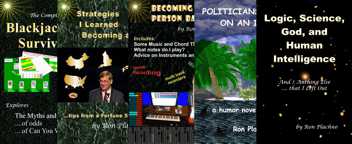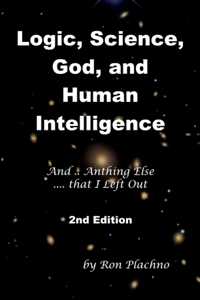|
|||||
|
CAN COMPUTERS BE AS INTELLIGENT AS HUMANS? This is a chapter in the book below, and one I personally found very interesting myself. While writing this book with an open mind, doing much research and thinking, I myself learned a lot. When I began this particular chapter I was just certain that human beings were quite smart, and that computers were just tools and were dumb. But at the end of the chapter, I began to question what is it that we hold so dear about human intelligence? Is it really that hard to duplicate? It left me with an odd feeling. It made me think of the several movies that have been out where computers and machines take over the world. But at the very least, it gives us humans some very serious philosophy items to think about.
There are perhaps two important parts to
human intelligence, at least. The first is knowledge, and the second
is the reasoning ability to use that knowledge. As most of us have
become aware, the ability of computer memory to memorize huge
amounts of books, and even photos and videos goes way beyond what
the human mind can do. So computers begin with being able to do one
of the two parts of intelligence, the knowledge part, extremely
well. Few of us would try to have our memories compete with being
able to memorize books word for word with that of a computer and
computer memory. We would lose every time - unless of course we
cheat and spill our coffee into the computer inner memory workings. When we put this all together... we may begin to wonder what do we even mean by human intelligence? Is it that unique? Or can we simply duplicate it? And if we cannot duplicate it today, perhaps tomorrow when we can might not be all that far off. More in the book of course. But then again, this at least for me is something that goes beyond ... and is now a very serious question in my mind. Well, the point of the book is not to convince anyone of anything, but perhaps to get all of us, including me, to think more, about some basic things.
|
|||||
|
Go to More about this Book by Clicking here please note: "excerpts" of our books shown here are excerpt of our ideas in the books. It will not be word for word. |
|||||

